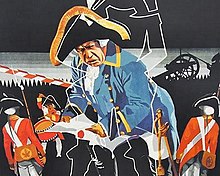Lieutenant Kijé (Prokofiev)
| Lieutenant Kijé | |
|---|---|
| Film music and orchestral suite by Sergei Prokofiev | |

From the film advertising poster, by Izrail Bograd
|
|
| Catalogue | (suite) Op. 60 |
| Composed | 1933–34 |
| Duration | (suite) approx. 20 minutes |
| Premiere | |
| Date | (suite) 21 December 1934 |
| Location | Paris |
| Conductor | Sergei Prokofiev |
Sergei Prokofiev's Lieutenant Kijé (Russian: Поручик Киже, Poruchik Kizhe) music was originally written to accompany the film of the same name, produced by the Belgoskino film studios in Leningrad in 1933–34 and released in March 1934. It was Prokofiev's first attempt at film music, and his first commission from within the Soviet Union; he had lived abroad since the 1917 October Revolution. After the film's release, Prokofiev adapted the music into what became a popular orchestral suite, his Op. 60.
In the early days of sound cinema, among the various distinguished composers ready to try their hand at film music, Prokofiev was not an obvious choice for the commission. Based in Paris for almost a decade, he had a reputation for experimentation and dissonance, characteristics at odds with the cultural norms of the Soviet Union. By early 1933, however, Prokofiev was anxious to return to his homeland, and saw the film commission as an opportunity to write music in a more popular and accessible style.
After the film's successful release, the five-movement Kijé suite was first performed in December 1934, and quickly became part of the international concert repertoire. It has remained one of the composer's best-known and most frequently recorded works. Elements of the suite's score have been used in several later films, and in two popular songs of the Cold War era.
Sergei Prokofiev graduated from the Saint Petersburg Conservatory in 1914, having by then acquired an early reputation as an avant-garde composer. His biographer Israel Nestyev asserts that the Second Piano Concerto of 1913 was "Prokofiev's ticket of admission to the highest circles of Russian modernism".
...
Wikipedia
